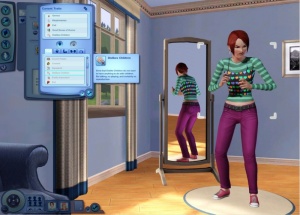The Sims 3
The Sims 3 is the third installment of the one-player, life simulation PC game, The Sims. The Sims Studios (developer) and EA Games (publisher) released the much anticipated sequel of The Sims 2 in June of 2009 to rave reviews. It sold over a million copies in its first week alone.
Just as its predecessors, players create characters called Sims and control their lives with no overall goal. The overarching motto of all The Sims games has been: "Build. Buy. Live." These are also the names of the "modes" in the game. Build Mode allows players to build property in the Sims World; Buy Mode allows players to populate these properties with objects for Sims to use; and Live Mode (the more prominent game player) allows players to control the actions of the Sims they create.
Contents
Build
Although there are pre-built homes available for Sims, a player may choose to build a home for their families. Build mode makes available numerous architectural and interior design options for the player to use, but for a price. (However, cheat codes for more funds can make the more extravagant options more readily available.) At the player’s prerogative, a family of Sims can live in an enormous mansion on the beach or a one-room house in a normal neighborhood.Players can also build commercial properties such as malls or parks for their Sims to visit. Commercial properties are given unlimited funds, but the quality of any venue is up to the player.
Buy
Buy mode is where players furnish the homes and lives of their Sims. Necessities, such as refrigerators and beds, and luxuries, such as decorations and entertainment devices, are all bought in buy mode using the Sims’ household funds. These funds can be earned through Sims’ work, cheat codes, or selling unneeded items in Buy Mode.Players new to the franchise are encouraged to buy a smoke detector and burglar alarm with other necessary items as Buy Mode is disabled when there is a burglar or fire in the house and these items yield the fastest emergency response.
Live
Sims have the ability to advance to up to seven age-levels (Baby, Toddler, Child, Teen, Young Adult, Adult, and Elder) before eventually dying of old-age.
During Sims’ lives, Sims behave much like the human controlling them. Toddlers are potty-trained and taught to walk and talk by their parents; children attend school Monday through Friday and do homework; teens can acquire a part-time job and make some money after school; young adults and adults can fall in love, marry, and have babies, and elders can retire.
Sims can also gain skills, making gameplay more interesting. For example, Sims can take cooking classes and read cooking books to increase their cooking skills and gain the ability to prepare fancier meals than Sims with lesser skill. These skills are also pivotal to careers around town; Sims in the military and police careers need a large amount of athletic skill to advance, for instance.
A Sim’s relationships with his family and neighbors is also an important part of the game. Just as there are there are friends, lovers, and enemies in real life, these relationships exist in The Sims 3 as well. Sims with jobs have bosses that they’d be wise to keep happy with them. Sims are also able to form a committed romantic relationship with one Sim, such as “going steady” or marriage, and have affairs with other Sims. (However, there is consequence if the victim witnesses this betrayal.)
Create-A-Sim
See also: Avatars
The Create-A-Sim tool allows the player to personalize each Sim’s clothing and physical features. Create-A-Sim also allows the player to give Sims personality traits that will affect gameplay such as Slob, Evil, Charismatic, and Heavy Sleeper. Combining Sims with contrasting traits can make households difficult. For instance, a "Neat" Sim and a "Slob" Sim may encounter difficulties living together.
Expand
The previous Sims games (The Sims and The Sims 2) were limited in ways to customize Sims. While The Sims strictly restricts Sims to pre-made outfits, faces, and hairstyles, The Sims 2 allows players to choose these. Also, with the release of The Sims 2, developers allowed the exchange of Sims through the game's website.[1] The area of the website in which players share their Sims is called: The Exchange. A player creates a Sim that they are proud of - using the create-a-sim tool in the game - and shares it for other players to download.
However, using mods from private websites, users add new clothing, hairstyles, and accessories to their individual games. When a Sim with these mods are shared through the exchange, the mod is shared as well. Often times, the third-party game modifications are more stylish and desired than the clothing offered with the game. One of the most popular private exchange websites is The Sims Resource (TSR) [2]
Due to the popularity of mods and The Sims 2 Exchange, The Exchange returned for The Sims 3 along with The Store, offering premium content from the game developers for currency called SimPoints. (A number of SimPoints are given to new players, but new SimPoints are bought using real money.)
Ethical concerns
In its most popular PC form, The Sims 3 is a single-player game. However, as a human life simulator, the game can still be used to discuss real-world ethical concerns.
Free Will versus Complete Control
In the options menu, there is a slider called "free will" that controls how much the player must control the Sims of their household. (At the highest free will Sims will fulfill their physical and social needs on their own; at the lowest, Sims may die if left unattended.) When choosing the lowest free will setting on the game there may be more ethical concerns. Is neglecting to help the Sim survive by ignoring it and letting it die ethical? Or, to take it a bit further, how about making all you Sims die on purpose with the intention of making a graveyard? Is it sick and unethical to want to kill all of your Sims? People will argue both ways. Authors, like Spence, argue that avatars are extensions of oneself on the virtual enviornment and therefore have universal public morality. Leaving them unattended under the conditions of free will would therefore be unethical.[3]
Good Sims and Bad Sims
Left with the game’s autonomy, are Sims who perform unethical or ethical actions. Are the Sims who carry out unethical behaviors morally wrong? Is this an example of artificial agents being held responsible for their actions?
As previously stated, players can give traits to their Sims using the Create-A-Sim tool. If a Sim is given the “Good”or “Evil” trait, who is ethically credited/blamed for their actions? The player or the Sim? Luciano Floridi would argue that its the agents fault. But, the user is in fact in control of choosing the traits, not the game/agent itself. Again, people can argue both ways and it's ultimately a gray area in what is ethical and what isn't.
Video Game Addiction
In the real world there is also a matter of the amount of time users are on this game. In one episode of the television show "Wifeswap", a mother ignores her children all day and plays The Sims. What happens in situations such as these, when the virtual world takes over the real world? Is the game at fault?
It is easy to spend hours living the lives of Sims. There are no goals that, upon completion, signify the end of the game or a good time to stop playing. The only time the game "ends" is when every member of the active household dies; given there are few accidents and all of the Sims aren't elders, this could take a long time.
Inappropriate Content for Children
The Sims franchise allows players to play a Sim over his or her life course. During this time, as the Sim grows from adolescence to adulthood and beyond, the Sim can engage in activities and interactions that come with aging. For example, teenager Sims and beyond can engage in romantic activities with other Sims and adult Sims can become pregnant through related sexual activities. Sims can also start violent fights with other Sims and even work in the criminal field, stealing objects for a living. Although the Sims is rated for Teens, most people of any age group can easily obtain access to it. This can raise ethical dilemmas: is it appropriate for minors to have their Sims engage in sexual activities? Is it also appropriate for them to begin fights with other Sims because it is part of a fun game? These are some of the issues that younger players can come into contact as they play The Sims.
References
- ↑ http://thesims2.ea.com/exchange/index.php?pid=Exchange
- ↑ http://www.thesimsresource.com/
- ↑ https://ctools.umich.edu/access/content/group/cd00dd55-2128-45a6-99cb-941eae4d8cda/Required%20Readings/3%20Avatars/Spence%20Meta%20Ethics%202008.pdf





